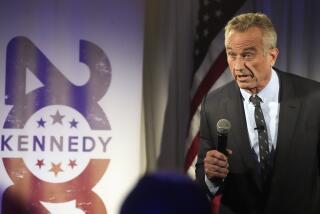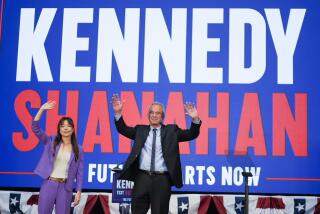Green Party Seeking Nominees for New Logo
- Share via
Move over, sunflower; the Green Party’s longtime symbol is facing retirement. The party launched a logo design contest Thursday to choose a new image to be splashed across posters, stickers, T-shirts and letterheads at its nominating convention set for June 23-28 in Milwaukee.
“We want to get people inspired and invigorated about being Green,” said Green Party fundraising director Kara Mullen.
The Green Party platform advocates a multiparty system, social justice, environmental responsibility, nonviolence and diversity.
Mullen is unsure how many entries the contest will attract, especially because of its fast-approaching deadline of April 25. But she hopes to pick a standardized logo that “reaches out to all cultures; something very simple.” She would like the logo to help combat misperceptions about the Green Party “being these tree-hugger hippie types, and that’s not the case at all,” Mullen said. “Yes, we embrace those people, but we also embrace everyone else.”
Independent presidential candidate Ralph Nader ran as a Green in the 2000 general election.
The contest winner will be featured on the Green Party website, www.gp.org, and will receive the first T-shirt printed with the new design.
*
Spell-check optional for Bush aide Hughes
Former Bush anti-terrorism advisor Richard Clarke claims his advice was ignored in the hectic days after Sept. 11 -- and a spelling error in presidential advisor Karen Hughes’ new book just might prove he’s right.
“Ten Minutes from Normal,” Hughes’ new insider account of her role in White House machinations up to, during and after Sept. 11, 2001, includes a passing mention of Clarke. He appears on page 258, in the chapter recounting the World Trade Center attacks -- as “Dick Clark,” missing an “e.”
His cameo comes when Hughes needs an Afghanistan expert to describe life under the Taliban for a speech Hughes was helping draft for President Bush. Apparently Clarke was so out of the loop, he was left out of both high-level meetings and the proofreading process.
*
‘Doonesbury’ tweaks Bush for good cause
The aging boomers and ex-hippies peopling Garry Trudeau’s “Doonesbury” comic strip have skewered the American right from newspaper pages for 34 years. But late last month, the satire benefited a good cause.
Trudeau’s Feb. 23 strip challenged readers to produce evidence of President Bush’s National Guard service in Alabama between May and November of 1972. “Become a witness! Win $10,000!” exclaimed signs presented by namesake character Mike Doonesbury in the strip, which is syndicated in about 1,400 newspapers nationwide.
Bush’s military service has come under media scrutiny in both the 2000 and current election. Producing no winner -- as intended -- the cartoon-strip contest ended last month with Trudeau’s donation of the $10,000 prize to the United Service Organizations, a nonprofit group that works to boost military morale.
The competition drew 1,600 entries, none deemed worthy of the cash kitty (though three were amusing enough to earn posting on the Doonesbury website, www.doonesbury.com.)
“There are a surprising number of stories that feature aliens, road trips, drinking, car crashes, and Elvis,” said David Stanford, the duty officer at the Doonesbury site. “I admit that I’m a little surprised that so many veterans are willing to compromise national security by going on record about top secret ops they participated in while serving with Bush at Roswell.”
*
By the Numbers
$132,500: President Bush’s largest hotel bill, charged by a New York City Sheraton on July 1, according to Fundrace.org.
$14,000: John F. Kerry’s largest hotel bill, charged by a San Diego Hilton on March 13, 2003, reports Fundrace.org.
Duly Quoted
“Well, the good news for Democrats -- now over half the country can identify a picture of John Kerry. The bad news, the majority still thinks he’s the dad from ‘The Munsters.’ ” -- Jay Leno on NBC’s “Tonight Show” on Tuesday.
*
Compiled from staff, Web and wire reports by Times staff researcher Susannah Rosenblatt.
More to Read
Sign up for our Book Club newsletter
Get the latest news, events and more from the Los Angeles Times Book Club, and help us get L.A. reading and talking.
You may occasionally receive promotional content from the Los Angeles Times.










